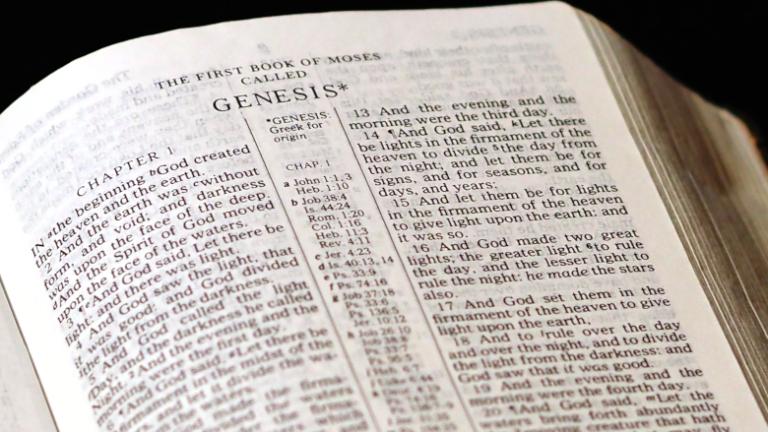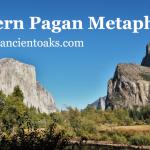Over on the Patheos General Christian channel, the Patheos Editorial Team has put together a piece titled Genesis 1:1 – Bible Verse and Perspectives. It’s part of their Questions & Answers series intended to provide high-level answers to basic questions about religious beliefs, practices, and history. This particular feature begins by saying:
Genesis 1:1 (“In the beginning, God created the heavens and the earth”) is one of the most foundational verses in the entire Bible. Its primary focus is the basic belief that an omnipotent God is responsible for the creation of the universe. The biggest distinction in how this verse would be interpreted by various religions centers around “how” God creates; something largely left unexplained by the passage.
It then goes on to provide short paragraphs on how various Christian traditions interpret this verse: Baptists tend to read it literally, while Catholics and Progressive Christians do not. It doesn’t cover every denomination, but it does a good job of listing what many different kinds of Christians believe, and of clearly stating that:
No major world religion has complete uniformity of belief among all of its practitioners.
It also includes perspectives from other religions. It’s quite appropriate to include a Jewish perspective, since Genesis was (and still is) Jewish before it was Christian. The Muslim perspective quotes a similar verse from the Qur’an – again, appropriate given the roots Islam shares with Christianity.
And then it includes a Pagan perspective.
What is written isn’t bad. It points out that many Pagans are polytheists and so “they may not adhere to the common monotheistic reading of Genesis 1:1.” I have no data to back me up, but when it says “many Pagans would still interpret the Genesis account metaphorically” I strongly suspect it’s more right than wrong. Whether that’s a good thing or a bad thing is another matter. And it’s exactly right when it says “it is impossible to summarize what all Pagans would believe about this verse, or even about the creation.”
The answer the article gives to “what is the Pagan perspective on Genesis 1:1?” is respectful and reasonable.
The problem is that the question is of limited relevance to Pagans or to people curious about Paganism. Because ultimately, there is no Pagan perspective on Genesis 1:1 or any other Christian scripture.
The Bible as literature is for everyone – the Bible as scripture is only for Christians
Even uber-atheist Richard Dawkins agrees that the Bible is a great work of literature. Numerous English idioms have their roots in the Bible. You cannot fully understand Western art, music, literature, and philosophy without at least a casual familiarity with the Bible, preferably the King James Version (and you can’t understand U.S. politics without an understanding of Calvinism, but that’s another rant for another time). As a work of literature, we are all free to read the Bible and to take what meaning and inspiration we find in its stories.
The Bible as literature is for everyone. It is scripture only for Christians. Genesis is one example of a creation myth, but only one among many. Its only relevance to Pagans is to compare and contrast it with other creation myths, especially others from the ancient Near East. There is no need for Pagans to offer perspectives on it, because it’s not our story.
The Pagan perspective on Genesis is as irrelevant as the Catholic perspective on The Charge of the Goddess or the Mormon perspective on The Book of Cernunnos – neither of which are scripture, but both of which are examples of writings that are meaningful to many Pagans and sacred to some.
When Pagans debate the Bible, we reinforce the idea that it is authoritative for us
I grew up going to Baptist Sunday School. I read the Bible as a young adult. And I’m a religion nerd – I’m genuinely interested in the world’s religions. I know the Bible better than most Christians, and it’s always tempting to jump in when someone misquotes the Bible, takes something out of context, or blatantly misinterprets something (the sin of Sodom was inhospitality – a serious offense in that culture – not homosexuality).
I do my best to walk away from those arguments. When Pagans argue from the Bible, we reinforce the idea that the Bible is authoritative for everyone. It is not. The Bible is a set of writings by and for a particular group of people living in a particular time and place. It is authoritative only for those who accept its authority. Being familiar with the Bible as literature does not require us to participate in discussions of the Bible as scripture.
What the Bible says about this or that is simply not relevant to Pagans and other non-Christians.
Our many Pagan traditions have many creation myths
Our ancient ancestors wondered where “all this” came from. They wondered, and they thought, and they told stories of primordial materials, of Creator Gods, of Titans giving way to Olympians. Some said humans were made by the Gods. Some said humans grew out of the Earth. These stories weren’t primitive attempts at science – no one believed they were literally true. They were myths: stories that provide meaning.
It can be interesting to compare creation myths across cultures. What do they have in common? Where are they different? But we do this for what it can tell us about the cultures that produced the myths, not to tease out some universal creation myth that never existed, much less some fragments of literal history.
There is no Celtic creation myth. Was there one that was lost? Or did the ancient Celts simply not find that question interesting enough to develop a story about it? While I’m extremely curious about deep questions like this, they’re not essential to living a good life.
Ultimately, where we come from is far less important than the fact that we are here. Now what are we going to do with this life and this world?
The modern Pagan creation myth is the Big Bang
I want to make sure there’s no misunderstanding: the Big Bang is a scientific theory grounded in a materialist worldview. It makes claims of literal truth, claims that hold up very well to examination – even though current physics breaks down a fraction of a second after the Big Bang and thus cannot answer questions of ultimate origins (I suspect those questions are unanswerable by humans, but that’s another topic for another time).
But the Big Bang is also a myth: a story that provides meaning. It says that in the beginning, all was one. And then the universe began to expand and coalesce. And then stars formed, and then planets orbiting the stars. And on at least one of those planets, life began, first as a single-celled organism, then as more complicated organisms, and then as the beautifully diverse and complex assortment of life we see and are a part of today.
I love the Greek, Norse, Egyptian, and other ancient creation myths. I find the creation myths of different cultures and traditions to be interesting and inspiring. But my creation myth is the Big Bang.
Focus on our own religion
I appreciate the Patheos Editorial Team including a Pagan perspective on this question. I wish they had asked a Pagan to write it, but honestly, I couldn’t have done substantially better with this question for this audience.
The core problem is that a general question was presented in a Christian context: “what’s your tradition’s perspective on Genesis 1:1?” instead of “what is your tradition’s creation myth and how do you interpret it?” This is similar to atheists who complain about the harmful effects of “religion” and then when you ask for examples, they’re all from conservative Christianity. Insisting that myths must be read literally simply isn’t an issue for Pagans, or Buddhists, or for Progressive Christians.
“Religion” is more than Christianity, and Christianity is not the norm against which all religions are evaluated – even though many Christians act like it is.
As Pagans, we need to focus on our own religion and our own myths and not get caught up in the myths of religions to which we do not belong. When general questions are presented in a Christian context we need to reframe them in a Pagan context or at least in a universal context.
Or we can simply say “that’s not part of my religion” and decline to answer.
















